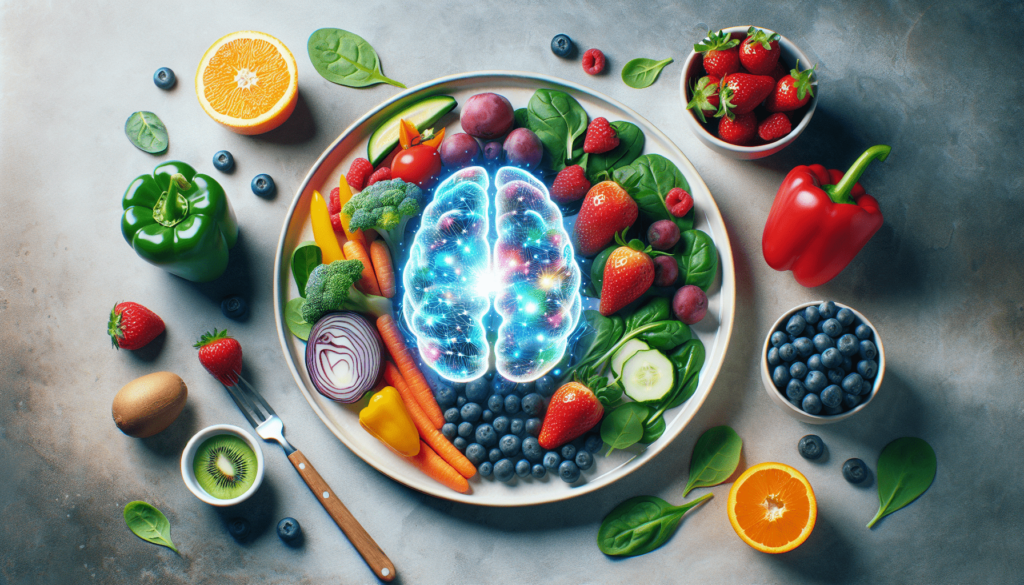Imagine being able to improve your mental health simply by changing your diet. It may sound too good to be true, but functional foods have been found to have a significant impact on mental well-being. Whether it’s incorporating omega-3 fatty acids for improved mood or consuming probiotics to reduce anxiety, these powerhouse foods have the potential to revolutionize the way we approach mental health. In this article, we will explore the fascinating connection between functional foods and mental well-being, and delve into the science behind how these foods work their magic. Get ready to discover a whole new way to nourish your mind and body!
The Relationship Between Diet and Mental Health
The impact of diet on brain health
When it comes to mental health, many people focus solely on therapy or medication as the primary treatment options. However, recent studies have shown that the food we consume also plays a crucial role in our mental well-being. Our brain requires a wide range of nutrients to function optimally, and a diet lacking in these can potentially lead to mental health disorders. By understanding the impact of diet on brain health, we can make informed choices to support our mental well-being.
The role of the gut-brain axis
Did you know that there is a connection between your gut and your brain? This connection is known as the gut-brain axis, a communication pathway that involves the bidirectional interaction between the central nervous system and the enteric nervous system in our gut. The health of our gut bacteria, also known as the microbiome, has a significant influence on our mental health. Certain foods can improve the diversity and abundance of beneficial bacteria in our gut, which in turn positively affects our brain health.
Inflammation and mental health
Inflammation is a natural response by our immune system to protect the body from harm. However, chronic inflammation can have detrimental effects on our mental health. Research has shown that certain diets, such as those high in processed foods, sugar, and unhealthy fats, can promote inflammation in the body, including the brain. On the other hand, an anti-inflammatory diet, rich in fruits, vegetables, whole grains, and healthy fats, can help reduce inflammation and promote better mental health.
Functional Foods and Their Benefits
Definition of functional foods
Functional foods are defined as food products that provide additional health benefits beyond their basic nutritional value. These foods often contain specific nutrients or bioactive compounds that can support various aspects of our physical and mental health. Unlike traditional foods, functional foods are intentionally fortified or modified to enhance their beneficial properties.
Examples of functional foods
There is a wide range of functional foods available that can support mental health. One example is fatty fish, such as salmon and sardines, which are rich in omega-3 fatty acids. These acids are essential for brain health and have been associated with a reduced risk of depression and anxiety. Another example is dark chocolate, which contains antioxidants that can enhance mood. Additionally, fermented foods like yogurt and kefir, which contain probiotics, can help improve gut health and promote better mental well-being.
Nutrients and bioactive compounds in functional foods that support mental health
Functional foods contain various nutrients and bioactive compounds that have been shown to support mental health. Omega-3 fatty acids found in fatty fish, walnuts, and flaxseeds help reduce inflammation and improve brain function. Magnesium and zinc, present in foods like spinach, pumpkin seeds, and oysters, play a role in mood regulation and cognitive function. Probiotics, found in fermented foods like kimchi and sauerkraut, can boost the production of neurotransmitters, including serotonin, which is often referred to as the “happiness hormone.”

Functional Foods for Reducing Stress and Anxiety
Foods rich in omega-3 fatty acids
Omega-3 fatty acids have been extensively studied for their potential to reduce stress and anxiety. Incorporating foods such as salmon, chia seeds, and hemp seeds into your diet can provide a natural source of these beneficial fats. Omega-3s help regulate cortisol, the stress hormone, and promote the production of neurotransmitters like dopamine and serotonin, which are essential for a balanced mood.
Foods containing magnesium and zinc
Magnesium and zinc are minerals known for their calming effects on the brain. Leafy greens like spinach, nuts such as almonds and cashews, and legumes like lentils are all rich sources of magnesium. Foods like oysters, beef, and pumpkin seeds are examples of zinc-rich options. Including these foods in your diet can support the reduction of stress and anxiety by promoting relaxation and improving overall mood.
Probiotics and their positive effects on mental health
The gut-brain axis plays a significant role in mental health, and probiotics can help maintain a healthy gut microbiome. Consuming foods like yogurt, kefir, and kimchi can introduce beneficial bacteria into your digestive system. These probiotics can enhance the production of neurotransmitters, reduce inflammation, and improve mood. Incorporating probiotics into your diet can have a positive impact on mental well-being and may even help alleviate symptoms of stress and anxiety.
Functional Foods for Boosting Mood and Cognitive Function
Foods high in antioxidants
Antioxidants are compounds that help protect our cells from damage caused by harmful molecules called free radicals. When it comes to mental health, antioxidants have been linked to improved mood and cognitive function. Colorful fruits and vegetables like berries, oranges, and leafy greens are excellent sources of antioxidants. Consuming these foods can help reduce oxidative stress in the brain and support overall mental well-being.
Foods rich in B vitamins
B vitamins, particularly B6, B9 (folate), and B12, are essential for proper brain function and the production of neurotransmitters. Foods like whole grains, legumes, leafy greens, and eggs are packed with these important vitamins. By incorporating these foods into your diet, you can support a healthy nervous system, enhance mood, and improve cognitive function.
The role of folate in mental health
Folate, also known as vitamin B9, is particularly important for mental health. Studies have shown that low levels of folate are associated with an increased risk of depression and cognitive decline. Leafy greens, avocados, and lentils are excellent sources of folate. Ensuring an adequate intake of folate-rich foods can help support mental well-being and may even play a role in preventing certain mental health disorders.
Cognitive-enhancing herbs and spices
Certain herbs and spices have been traditionally used to enhance cognitive function and improve mood. Turmeric, for example, contains the compound curcumin, which has been shown to have anti-inflammatory and antioxidant properties. Rosemary has been associated with improved memory and focus. Incorporating these herbs and spices into your cooking can provide additional cognitive benefits and add flavor to your meals.

The Importance of a Balanced Diet
The concept of a balanced diet
A balanced diet is essential for overall health, including mental well-being. It involves consuming a variety of foods from different food groups to ensure adequate intake of essential nutrients. A balanced diet typically includes fruits, vegetables, whole grains, lean proteins, and healthy fats. By including a wide range of nutrients in your diet, you can provide your brain with the necessary building blocks for optimal mental health.
The impact of a poor diet on mental health
A poor diet, characterized by excessive intake of processed foods, sugary snacks, and unhealthy fats, can have a detrimental impact on mental health. Such a diet often lacks the nutrients necessary for proper brain function and can contribute to inflammation and oxidative stress. Additionally, fluctuations in blood sugar levels caused by a poor diet can lead to mood swings and increased feelings of anxiety. It is important to be mindful of our food choices and prioritize the consumption of nutrient-dense foods for better mental well-being.
Tips for incorporating functional foods into a balanced diet
Incorporating functional foods into a balanced diet is easier than you might think. Start by adding a variety of fruits and vegetables to your meals, aiming for different colors and textures. Swap processed snacks for nuts, seeds, or yogurt with probiotics. Opt for whole grains instead of refined grains and choose lean sources of protein like fish, poultry, and legumes. Experiment with herbs and spices to enhance the flavor and nutritional value of your dishes. Small changes like these can go a long way in providing your body and brain with the nutrients they need.
Functional Foods in Treating Mental Health Disorders
Functional foods as complementary therapies
While functional foods cannot replace professional treatment for mental health disorders, they can serve as valuable complementary therapies. Incorporating nutrient-dense foods into your diet can support your overall mental well-being and may potentially alleviate certain symptoms. It is important to consult with a healthcare professional to develop a comprehensive treatment plan and to determine how functional foods can fit into your individualized care.
The potential role of functional foods in managing depression and anxiety
Research has shown that certain functional foods have the potential to support the management of depression and anxiety. Omega-3 fatty acids, for example, have been found to be effective in reducing depressive symptoms. Probiotics have also shown promise in alleviating symptoms of anxiety and depression, likely through their impact on the gut-brain axis. While more research is needed, incorporating these functional foods into a comprehensive treatment plan may offer additional benefits for individuals with mental health disorders.
Adapting the diet for specific mental health conditions
Different mental health conditions may benefit from specific dietary considerations. For example, individuals with depression may benefit from foods rich in omega-3 fatty acids and B vitamins, while those with anxiety might find relief from probiotic-rich foods and magnesium-rich options. Consulting a healthcare professional, such as a registered dietitian, can help tailor a specialized diet to address specific mental health conditions and individual needs.
Research and Evidence
Scientific studies on the effects of functional foods on mental health
Numerous scientific studies have investigated the impact of functional foods on mental health. These studies have provided valuable insights into the potential benefits of various nutrients and bioactive compounds. For example, a study published in the Journal of Clinical Psychiatry found that omega-3 fatty acids can significantly reduce symptoms of depression. Another study published in the journal Nutrients highlighted the positive effects of probiotics on anxiety and depression. These studies, among many others, contribute to the growing body of evidence supporting the role of functional foods in promoting mental well-being.
Limitations of current research
While the existing research on functional foods and mental health is promising, there are still limitations that need to be addressed. Many of the studies conducted have been observational, relying on self-reported dietary intake and subjective measures of mental health. Further randomized controlled trials are needed to establish stronger causal relationships and determine optimal dosages of functional foods. Additionally, more research is needed to better understand individual differences and the long-term effects of functional foods on mental health.
Future directions for studying functional foods and mental health
As the field of nutritional psychiatry continues to evolve, there are several future directions for studying the relationship between functional foods and mental health. Researchers can explore the potential synergistic effects of combining multiple functional foods in specific ratios. Longitudinal studies can be conducted to assess the long-term effects of dietary interventions on mental health outcomes. Additionally, further research is needed to investigate the mechanisms by which functional foods influence brain health and mental well-being.
Considerations and Precautions
Individual differences and varied responses
It is important to note that individual differences can impact how functional foods affect mental health. Factors such as genetics, underlying health conditions, and personal preferences can influence responses to certain foods. What works for one person may not work for another. It is essential to pay attention to how your body and mind respond to specific functional foods and to adjust your diet accordingly.
Possible interactions with medications
Certain functional foods, especially those high in bioactive compounds, may interact with medications. For example, St. John’s wort, an herb frequently used for its mood-enhancing properties, can interfere with the effectiveness of certain antidepressant medications. It is essential to consult with your healthcare professional, including your primary care physician and pharmacist, to ensure that consuming functional foods will not interfere with any prescribed medications.
Consulting a healthcare professional
When it comes to making dietary changes for mental health, it is always recommended to consult with a healthcare professional. A registered dietitian can provide personalized guidance and support in incorporating functional foods into your diet. They can help ensure that your dietary choices align with your individual needs and objectives. By working alongside a healthcare professional, you can optimize the potential benefits of functional foods while taking into account any specific considerations or precautions.
Conclusion
The potential of functional foods in promoting mental well-being is an exciting area of research. The relationship between diet and mental health is becoming increasingly clear, with studies highlighting how nutrients and bioactive compounds can impact our brain health and overall mental well-being. Functional foods have the potential to support stress reduction, anxiety management, mood enhancement, and cognitive function. However, it is important to remember that functional foods should be viewed as part of a holistic approach to mental health, complementing other therapies and interventions. Continued research and education are needed to fully understand the complexities of the relationship between functional foods and mental health. By incorporating nutrient-dense functional foods into a balanced diet, we can take an active role in supporting our mental well-being and promoting a healthier mind-body connection.
